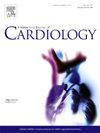Comparison of temporary mechanical circulatory support devices for patients with cardiogenic shock after acute myocardial infarction: A network meta-analysis of randomized controlled trials
IF 3.2
2区 医学
Q2 CARDIAC & CARDIOVASCULAR SYSTEMS
引用次数: 0
Abstract
Background
Despite the high mortality of cardiogenic shock after acute myocardial infarction (AMI-CS), the comparative efficacy and safety of mechanical circulatory support (MCS) in patients with AMI-CS is unknown. This study aimed to compare the efficacy and safety of various MCS with initial medical therapy for AMI-CS patients.
Methods
We searched PubMed and EMBASE in July 2024. Randomized controlled trials (RCTs) comparing at least any of the following 2 were included: initial medical therapy, intra-aortic balloon pump (IABP), percutaneous ventricular assist device (pVAD), or extracorporeal membrane oxygenation (ECMO). We performed a network meta-analysis using a frequentist approach. The primary outcome was mid-term (6–12 months) mortality. The secondary outcomes were short-term (30-day or in-hospital) mortality, major bleeding, and vascular complications.
Results
We included a total of 1845 patients with AMI-CS from 14 RCTs. There was no significant difference in short-term mortality between the treatment groups. However, pVAD and ECMO were associated with higher risks of major bleeding and vascular complications compared to initial medical therapy. Compared to initial medical therapy, pVAD (hazard ratio [HR], 0.77; 95 % confidence interval [CI], 0.60–1.00; p = 0.054) and ECMO (HR, 0.51; 95 % CI, 0.26–1.01; p = 0.054) were associated with the marginal benefits in reducing mid-term mortality.
Conclusions
In our study, there was no significant benefits of MCS devices in reducing short-term mortality, and pVAD and ECMO were associated with a higher incidence of major bleeding and vascular complications. Although not statistically significant, MCS showed a favorable trend in mid-term mortality.
求助全文
约1分钟内获得全文
求助全文
来源期刊

International journal of cardiology
医学-心血管系统
CiteScore
6.80
自引率
5.70%
发文量
758
审稿时长
44 days
期刊介绍:
The International Journal of Cardiology is devoted to cardiology in the broadest sense. Both basic research and clinical papers can be submitted. The journal serves the interest of both practicing clinicians and researchers.
In addition to original papers, we are launching a range of new manuscript types, including Consensus and Position Papers, Systematic Reviews, Meta-analyses, and Short communications. Case reports are no longer acceptable. Controversial techniques, issues on health policy and social medicine are discussed and serve as useful tools for encouraging debate.
 求助内容:
求助内容: 应助结果提醒方式:
应助结果提醒方式:


